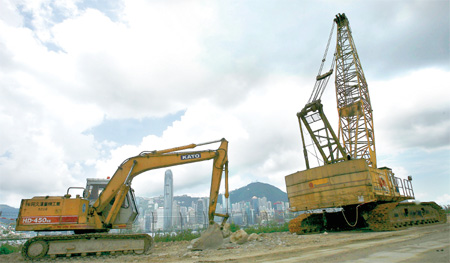Strategic policies required to promote 6 industrial areas
Updated: 2010-09-03 07:58
By Thomas Chan(HK Edition)
|
|||||||||
|
Heavy machinery is in operation on the site of the proposed cultural district in West Kowloon. Three master plans designed by world famous architects are on public display at the moment. Paul Hilton/Bloomberg News |
The SAR Government has proposed six industrial areas for the revitalization of Hong Kong's economy. However, except for the allocation of some pieces of land for private hospitals, little planning or implementation has been done.
The government might argue that the British colonial legacy has proven an obstruction to implementation of industrial policy since the return. Such policies however have been regarded as the key policy instruments of successful East Asian economies from Japan to Korea, Taiwan, Singapore, and the Chinese mainland. It was true that the Hong Kong government did not need strategies, industrial or otherwise, during the colonial period (with the exception of the investment plans of MacLehose in the 1970s). Yet, this did not mean that there were not strategy policies or policy considerations; these were accomplished in London without the need for the British government to consult local interests and the general population of Hong Kong. Since the Handover and under the "One country, Two systems" regime, the SAR government no longer has the service of a national government to take care of its strategic development policy decisions. Unfortunately, the succeeding two administrations have yet to realize the importance of strategic policy for local economic and social developments. Instead, the governance of the city economy has continued the colonial practices of piece-meal initiatives and efforts. The consequence of this has been a lack of any coordination in policies and government measures for more than 10 years.
The absence of any conscious strategic policy and planning precludes any government from making active interventions in any policy area. The inaction of the government means the status quo of the colonial era obtains and actually worsens, since the British intervened whenever necessity arose. So, pre-1997 trends have been exacerbated in the last 13 years. The economy has become increasingly narrowly focused on just a few sectors instead of being diversified. This has thwarted innovative developments; and society now faces greater polarization and social exclusion creating more social tension and political conflicts. Meanwhile, Hong Kong lags increasingly behind high growth economies in the region and has barely recovered from the two financial crises (with the latest still not over yet).
Now is the time for the SAR government to propose the six industrial areas for priority development. As of yet, proposed policy measures, if any, for the implementation of the industrial areas are vague and poorly formulated. No linkage, based on sectors that has been suggested. Nor has there been a broad debate on policy. Even demarcating the policy boundary of the industrial areas has proven arduous. Of the six (education services, medical services, testing and certification services, environmental industries, innovation and technology, and cultural and creative industries), it is difficult to understand what innovation and technology is, while testing and certification services can be found in many industries. Even though, these fields are regarded as knowledge intensive, the SAR government has not put forward a group category of knowledge industries or knowledge economy or properly and precisely define it. Further, unlike the Korean case, there is no single Ministry of Knowledge Economy to coordinate. One has no idea which industrial area will fall into which of the numerous government policy bureaus. Referring again to the Korea example that departmental portfolio includes trade, energy, and industry. The Korean government sees these as integrative parts which require close (single) ministerial coordination. Our SAR government has the four traditional pillar industries (financial services, tourism, trade and logistics, and professional services) alongside the six industrial areas, and yet we have not established a connection and linkage in policies between the two camps. The subsequent problem is that Hong Kong has no strategic policies for the traditional pillar industries, nor does it have strategic policies for the six industrial areas. In addition, there is no overall strategic policy. The SAR government has not learnt any lessons and simply perpetuates a worsening situation.
For economic restructuring and revitalization, Hong Kong, like other successful overseas examples in the real (not textbook) world, needs an industrial policy - an overarching strategy in policy for the development of industry/services in the local economy. There is also a need for an energy policy, which forms the basis for any low-carbon sustainable economic development. There is another need for a social policy that concerns the building up of social and cultural capital (and other social externalities that affect economy and society). To a lesser degree there is also a need for a technology policy as well.
When will SAR government officials unlearn their distorted colonial ways of thinking and relearn lessons on the modern governance of a post-industrial society like Hong Kong?
The author is head of China Business Centre, Hong Kong Polytechnic University.
(HK Edition 09/03/2010 page4)
